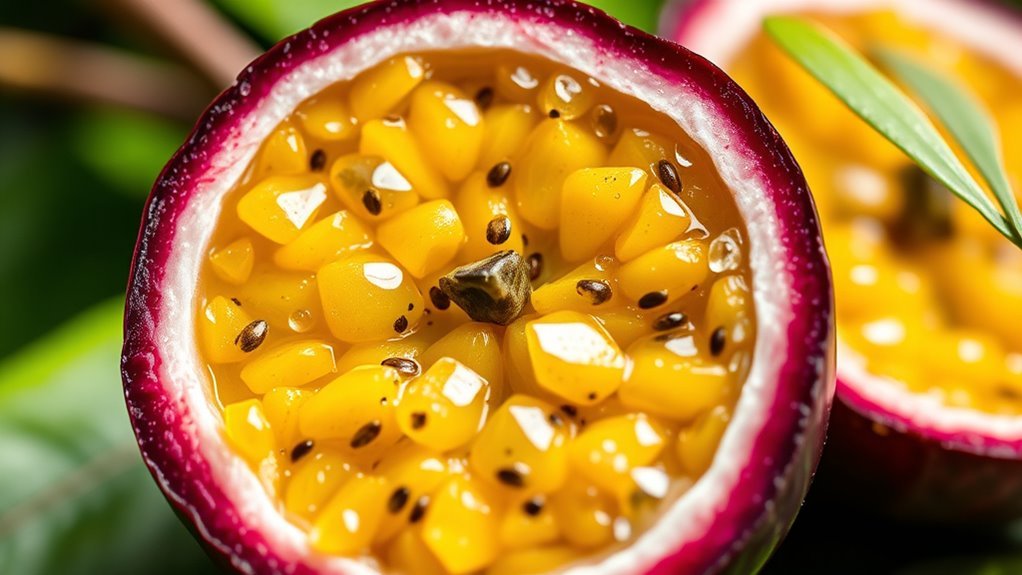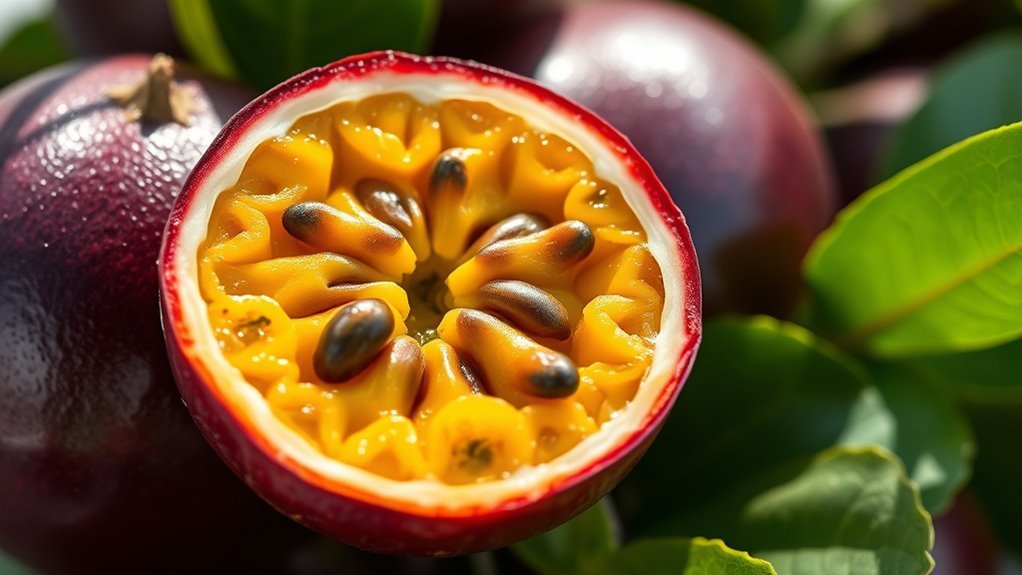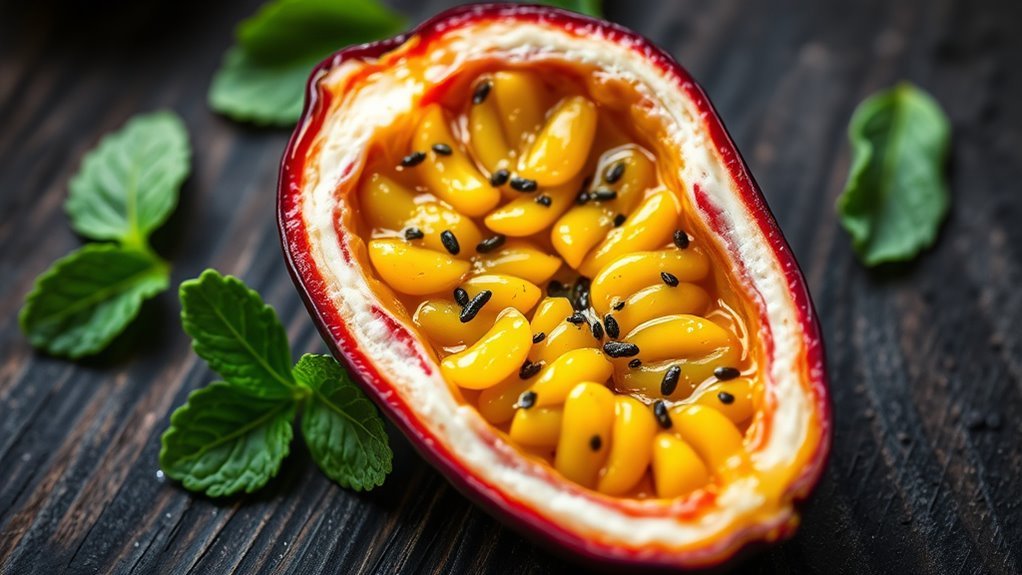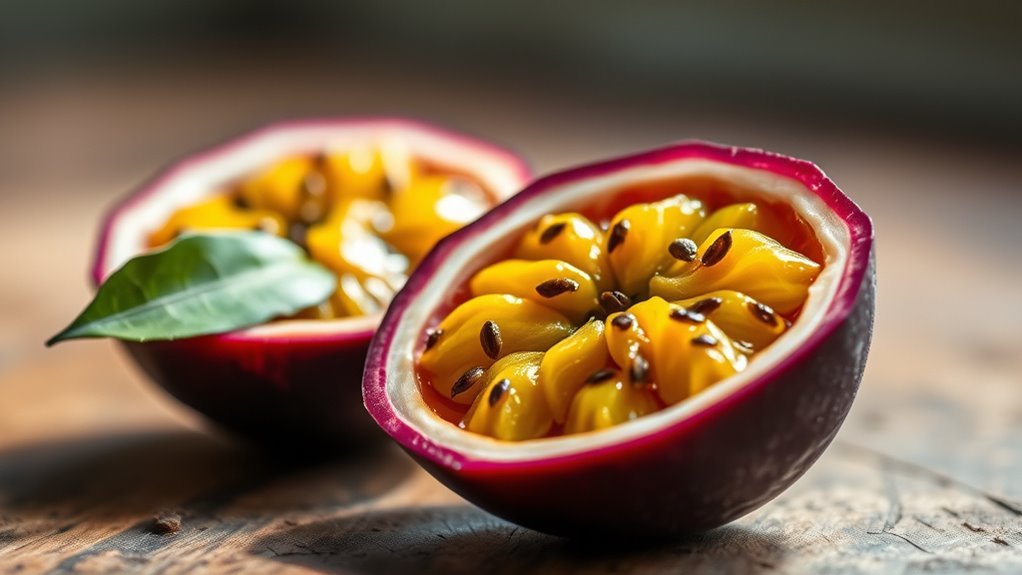Passion fruit can be enjoyed on a keto diet, but moderation’s key. Each medium fruit has about 4 grams of carbs, which can add up quickly if you aren’t careful. While it’s packed with vitamin C and fiber, you must balance its natural sugars with your daily carb limits. Mindful consumption allows you to savor its unique flavor without compromising ketosis. If you want to discover more about how to incorporate it into your meals and other low-carb options, keep going!
Nutritional Profile of Passion Fruit

Passion fruit, with its vibrant exterior and unique flavor, packs a surprising nutritional punch. This tropical fruit is rich in vitamin content, particularly vitamin C, which supports your immune system and skin health. You’ll also find a wealth of dietary fiber in passion fruit, aiding digestion and promoting a feeling of fullness. Beyond its vitamins and fiber, it boasts impressive antioxidant properties, which help combat oxidative stress and reduce inflammation in your body. By incorporating passion fruit into your diet, you’re not just enjoying its sweet and tangy taste, but also reaping numerous health benefits. So, if you’re seeking a nutrient-dense fruit, passion fruit could be a fantastic addition to your culinary repertoire.
Carb Content and Serving Sizes

When considering the keto-friendliness of passion fruit, it’s important to examine its carbohydrate content and appropriate serving sizes. Each passion fruit contains about 4 grams of carbs, which can fit into a low-carb diet when consumed mindfully. For effective carb counting, you might opt for one medium-sized fruit as a serving suggestion, providing a sweet, tangy flavor without overwhelming your daily carb limit. If you’re looking to enjoy passion fruit, consider using it as a topping for keto-friendly yogurt or desserts, keeping portions in check. This way, you can savor its unique taste while maintaining your keto goals. Remember, moderation is key to enjoying fruits on a ketogenic diet without compromising your carb intake.
Health Benefits of Passion Fruit

The vibrant allure of passion fruit goes beyond its unique flavor; it offers several health benefits worth noting. Packed with vitamin C, passion fruit can provide immune support, helping your body fend off illnesses. Its high fiber content aids digestion, promoting gut health and potentially preventing constipation. Additionally, passion fruit contains antioxidants like carotenoids and polyphenols, which combat oxidative stress and may lower the risk of chronic diseases. The fruit’s low-calorie nature makes it a guilt-free addition to your diet, enhancing your meals without adding excess calories. Incorporating passion fruit into your routine not only elevates your culinary experience but also supports overall wellness, making it a fantastic choice for anyone looking to boost their health naturally.
How Passion Fruit Fits Into a Keto Diet
If you’re following a keto diet, you might wonder how fruits like passion fruit fit into your meal plan. Passion fruit offers a unique flavor and nutritional benefits, making it an interesting option for those on a keto journey. With about 4 grams of net carbs per 100 grams, its keto compatibility can be favorable in moderation. The fruit’s high fiber content can also help you feel full, which is essential on a low-carb diet.
Incorporating passion fruit into your meals can enhance variety without derailing your macro goals. Just be mindful of portion sizes to stay within your carb limits. Enjoying this tropical fruit can bring a revitalizing twist to your keto lifestyle while still keeping your goals in check.
Creative Ways to Use Passion Fruit in Meals
Passion fruit can add a unique flavor and nutrition boost to your meals in unexpected ways. You might consider using it as a topping for your breakfast bowl, enhancing the taste of yogurt or chia pudding, or incorporating it into salad dressings and marinades for a tangy twist. These creative uses not only elevate your dishes but also help you stay compliant with a keto diet.
Breakfast Bowl Toppings
While many fruits are off-limits on a ketogenic diet, passion fruit can be a delightful exception when used in moderation. It’s low in carbs and brings a unique flavor to your breakfast bowl. Try using passion fruit as a topping idea for Greek yogurt or cottage cheese, adding a creamy texture and a burst of tropical taste. You can also mix it with chia seeds for a nutritious pudding or sprinkle it over a low-carb smoothie bowl. Its tangy sweetness pairs well with nuts and seeds, enhancing both flavor and crunch. Remember, just a few scoops can elevate your breakfast without derailing your keto goals, giving you the freedom to enjoy a revitalizing start to your day.
Salad Dressings and Marinades
When you’re looking to elevate your salads or marinades, incorporating passion fruit can add a revitalizing twist that’s both flavorful and keto-friendly. A passion fruit vinaigrette can transform your greens, offering a sweet-tart flavor that pairs beautifully with leafy greens, avocados, and nuts. You can also create a tropical marinade for chicken or fish, infusing them with a bright, zesty essence.
| Dressing/Marinade | Ingredients |
|---|---|
| Passion Fruit Vinaigrette | Passion fruit, olive oil, vinegar, salt |
| Tropical Marinade | Passion fruit, lime juice, garlic, herbs |
These creative uses not only enhance your meals but also align well with your keto lifestyle, making every bite a delight.
Potential Drawbacks of Passion Fruit on Keto
Although passion fruit offers several health benefits, it’s important to take into account its potential drawbacks when following a keto diet. One key concern is its sugar content; despite its delicious flavor profile, it contains natural sugars that could hinder your carb intake. While the fiber benefits can be helpful for digestion, you’ll need to practice portion control to avoid exceeding your daily carb limit. A small serving may be fine, but larger amounts can quickly add up. Balancing the enjoyment of passion fruit with these considerations is essential for maintaining ketosis. If you’re craving something fruity, be mindful of how much you consume to stay aligned with your keto goals.
Other Low-Carb Fruits to Consider
If you’re looking for low-carb fruits to fit your keto lifestyle, berries are a great option due to their lower sugar content and high fiber. Avocados also stand out as a nutrient-dense choice, packed with healthy fats and essential vitamins. Incorporating these fruits can help you maintain your carb limits while enjoying a variety of flavors.
Berries: Low-Carb Options
While many fruits are high in carbohydrates and can disrupt a ketogenic diet, berries stand out as a low-carb alternative that can fit into your meal plan. With berry varieties like strawberries, raspberries, and blackberries, you can enjoy delicious options that typically contain fewer carbs than other fruits. These berries not only satisfy your sweet tooth but also pack antioxidants and vitamins. Incorporating them into low carb recipes is easy—try adding them to smoothies, salads, or yogurt for a revitalizing treat.
Avocado: Nutrient-Dense Choice
After exploring low-carb options like berries, it’s worth considering avocados as another excellent fruit choice for a ketogenic diet. Avocados are not only low in carbohydrates but also packed with healthy fats, offering numerous avocado benefits. They’re rich in monounsaturated fats, which can support heart health and improve satiety, making it easier to maintain your diet. Additionally, avocados enhance nutrient absorption due to their fat content, aiding in the utilization of fat-soluble vitamins like A, D, E, and K. Incorporating avocados into your meals can elevate flavors while keeping you on track. Whether you enjoy them sliced, smashed, or in smoothies, avocados are a versatile and nutrient-dense choice that aligns beautifully with your keto lifestyle.
Final Thoughts on Passion Fruit and Keto
Although passion fruit can be a delightful addition to your diet, it’s important to take into account its carbohydrate content when following a keto lifestyle. While it offers unique flavors and nutrients, moderation is key. If you’re craving something sweet, consider these keto alternatives:
- Berries (like raspberries or strawberries)
- Avocado for creaminess
- Unsweetened coconut
- Zucchini noodles with a sauce
- Sugar-free gelatin for dessert
Ultimately, it’s necessary to balance your passion fruit intake with other low-carb foods. By being mindful of your daily carb limits, you can enjoy the occasional taste of this exotic fruit while maintaining your keto goals. Remember, flexibility is part of the journey, and finding what works for you is essential!
Frequently Asked Questions
Can Passion Fruit Cause Digestive Issues on a Keto Diet?
You might think that adding any fruit to your diet could lead to digestive issues, but that’s not always the case. Passion fruit, rich in fiber, can actually support digestive health. However, if you’re sensitive to high-fiber foods, it might cause some discomfort. Listen to your body; moderation is key. If you find it doesn’t sit well with you, consider reducing your intake or choosing alternatives that align better with your digestive needs.
Is Passion Fruit Safe for People With Diabetes?
When considering if passion fruit is safe for people with diabetes, it’s important to note its low glycemic index, which means it won’t greatly spike your blood sugar. Additionally, passion fruit offers health benefits like antioxidants and dietary fiber, which can aid in overall health. Enjoying it in moderation can provide you with a tasty treat without compromising your blood sugar levels. Just be mindful of your portion sizes!
How Can I Store Passion Fruit for Freshness?
To store passion fruit and preserve freshness, keep them in a cool, dry place at room temperature if you’ll use them soon. For longer storage, refrigerate them in a produce drawer. Make certain they’re unwashed and in a breathable bag. You can also freeze the pulp for up to a year, which helps maintain flavor. Just remember, proper passion fruit storage guarantees you enjoy their unique taste for longer!
What Is the Best Time to Eat Passion Fruit?
Have you ever wondered when’s the best time to enjoy the deliciousness of passion fruit? For ideal consumption, consider eating it in the morning or as a midday snack. This timing allows you to benefit from its rich vitamins and antioxidants, helping to boost your energy levels throughout the day. Eating passion fruit regularly can enhance your overall well-being, so savor it when you can for maximum freshness and flavor!
Are There Any Allergens Associated With Passion Fruit?
When considering passion fruit allergies, it’s important to note that some people may experience allergic reactions. Symptoms can range from mild to severe, including itching, hives, or gastrointestinal issues. If you have a history of food allergies, you should be cautious. It’s always a good idea to consult a healthcare professional before trying new foods, especially if you’re unsure how your body will react. Enjoying passion fruit in moderation is key!
Frequently Asked Questions about Passion Fruit and Keto
1. Is passion fruit low in carbs?
Yes, passion fruit is relatively low in carbohydrates compared to many other fruits. A typical serving of passion fruit (about 100 grams) contains approximately 23 grams of carbohydrates, but it also has a good amount of dietary fiber, which can help lower the net carb count. For those following a strict keto diet, it’s essential to account for the fiber content to balance your carb intake.
2. Can I eat passion fruit on a keto diet?
Yes, you can eat passion fruit on a keto diet, but moderation is key. While it is lower in carbs compared to many other fruits, consuming it in large quantities can still add up. It’s best to limit your intake to a small serving to stay within your daily carb limit while enjoying its unique flavor and nutritional benefits.
3. What are the health benefits of passion fruit?
Passion fruit is packed with vitamins A and C, antioxidants, and dietary fiber. These nutrients can help boost your immune system, improve digestion, and provide anti-inflammatory benefits. Additionally, the antioxidants in passion fruit can help protect your cells from oxidative stress, making it a nutritious addition to your diet, even while on keto.
4. How does the fiber content in passion fruit affect keto?
The fiber content in passion fruit plays a significant role in its compatibility with a keto diet. While the total carbohydrate count may seem high, fiber is not digested and does not raise blood sugar levels. Therefore, you can subtract the fiber grams from the total carbohydrates to calculate the net carbs, making it easier to incorporate into your daily carb allowance.
5. What is the best way to enjoy passion fruit on a keto diet?
Passion fruit can be enjoyed in various ways while following a keto diet. You can eat it raw by scooping out the pulp and seeds, add it to keto-friendly smoothies, or use it as a topping for low-carb desserts. Pairing it with healthy fats like coconut cream or Greek yogurt can enhance its flavor while keeping your meal keto-friendly.


